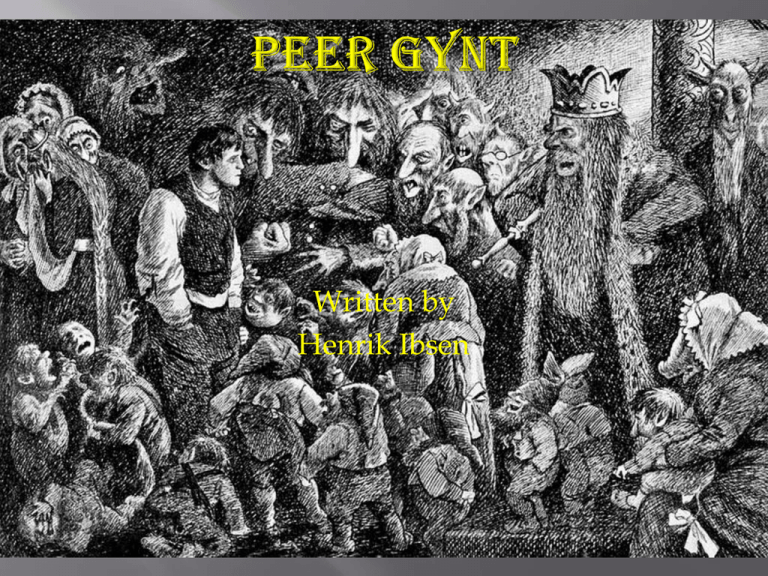Peer Gynt
advertisement

Written by Henrik Ibsen Peer gynt was published in 1845 It is loosely based on Fairy Tale The first U.S. Production was at the chicago grand opera house Theatre guild production went on Broadway The title is significant because it is the main charcter’s name and the story follows his life The setting time wise is in the early 1800’s The peer goes to multiple places throughout the story so I will list them in order He starts in the mountains of norway He then enters the Land of the Trolls Then he goes back to Norway After that he goes to Morocco Later he goes to Egypt Finishing it up he travels back to Norway This relates to the time period because it talks about events that happen during the time period as he travels to those places The setting is significant because the setting changes represent the changes in Peer’s life Our first theme is lying always catches up. Peer gets himself into many lies in his adventures and they all catch up and bite him in the end of the story. Our other theme is that you should always be yourself. In the play a mysterious figure tells Peer to be himself (in old English), Peer does not do so and it ends poorly for him The central conflict in Peer Gynt is that he keeps traveling places and making personas, which create enemies for him. Protagonist: Peer Gynt Antagonist: Peer Gynt and the World This is because his travels progress plot points but at the same time he gets the better of himself by always trying to be larger than life. In the beginning Peer lives with his mom and is jealous of his ex and her imminent wedding date, so he goes to crash her wedding, after putting his mom on top of a roof. Everyone at the wedding hates him and the bride back away from him. He kidnaps the bride and is banished to the mountains for it. He almost gets married into Troll royalty, but can’t agree on the terms. He then builds a hut in the Norwegian mountains and lives with the kidnapped Bride Towards the middle of the play, his troll almost bride comes back with Peer’s son, Peer denies its his and leaves his bride in the hut as he goes to town and witnesses his mother’s death. After which, he travels overseas to Morocco. He becomes a wealthy businessman and one day he gathers his fellow businessmen and explain plan to make them all wealthy then they backstab him and take his ship. He steals an emperor’s clothes and then pretends to be a prophet. as an prophet he falls with the chief’s daughter who subsequently steals all his valuables. Coming to the end of the play Peer becomes a historian and gains supreme knowledge. After that he becomes an emperor. He leaves that, on his way back he shipwrecks and lands on Norway. Peer: a chronic liar, tries to live larger than life, is obsessed with women, is very fickle. Has an amazing life but is unable to see that for himself. Peer: I can say what I will; and my sword can smite! Mind yourself! Hu, hei, now the blow falls crushing! King Saul slew hundreds; Peer Gynt slew thousands! [Cutting and slashing.] Who are you? The Voice: Myself. Peer: Forward and back, and it’s just as far; out and in, and it’s just as strait. — Time wears away and the river gnaws on. Go roundabout, the Boyg said; — and here one must. Åse: Oh, Lord my God, isn’t he coming? The time drags so drearily on. I have no one to send with a message; and I’ve much, oh so much, to say. I haven’t a moment to lose now! So quickly! Who could have foreseen! Oh me, if I only were certain I’d not been too strict with him! Parish: an ecclesiastical district having its own church and member of the clergy. Prate: to talk excessively and pointlessly; babble Cantankerous: disagreeable to deal with Hither: to or toward this place Counsel: opinion or instruction given in directing the judgment or conduct of another My personal reaction to the play is that is was an interesting comedy, it was very sporadic in places and had no real connecting factors between the places that Peer travelled other than Peer just felt like going there. I find it easiest to relate it to Forest Gump in modern day terms. Except without a recurring love interest and instead many love interests. I also care to mention that I thoroughly enjoyed Forest Gump just like I enjoyed Peer Gynt.




